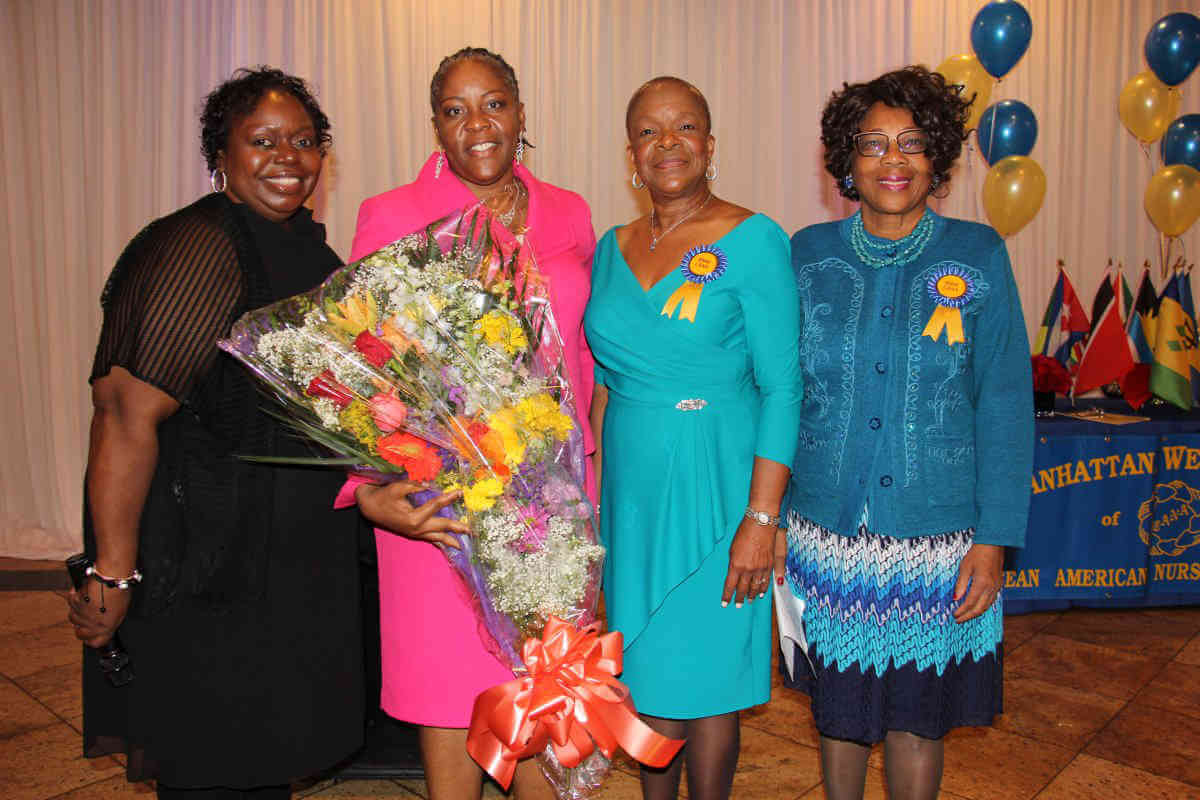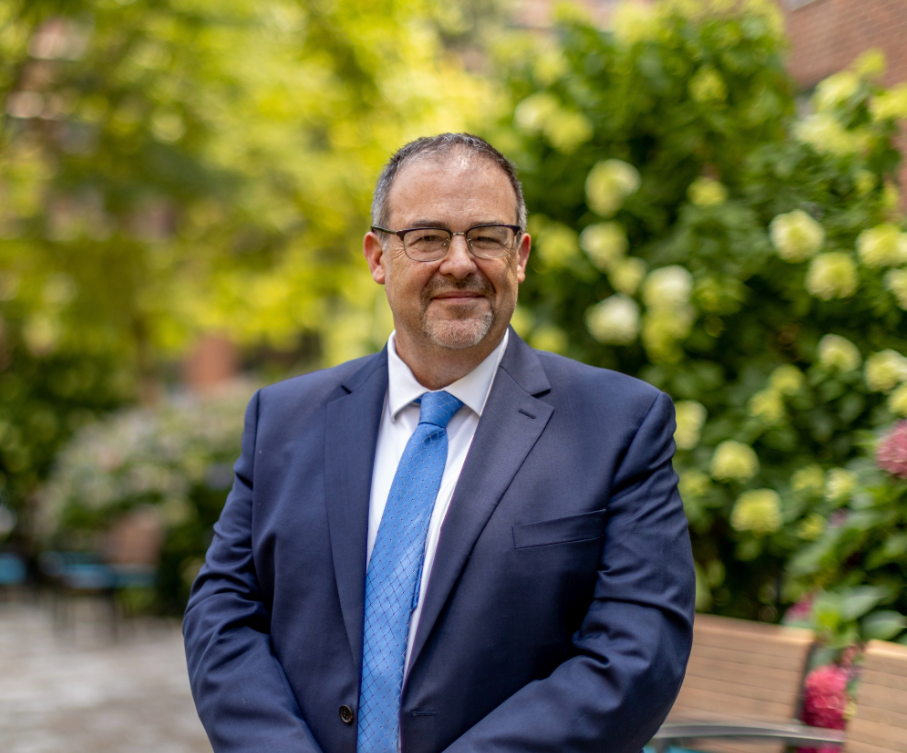A Dominican-born nursing administrator at Montefiore Medical Center in the Bronx is urging her colleagues to establish greater connectivity, saying it is essential for patient care.
“We, humans, despite our faults and our behavior to the contrary, we like to have a sense of belonging to something,” said Registered Nurse Dawn Africa, administrative nurse manager for the Post-Partum, Nursery and NICU units at Montefiore Medical Center, in delivering the keynote address at the 23rd Annual Vernese Weekes Scholarship Luncheon of the Bronx, Manhattan and Westchester Chapter of the Caribbean American Nurses Association (BMW CANA).
“As a career nurse, we often speak about staff engagement that can be translated to mean positive connections in the work environment, and positive connections directly affect patient care,” she added at the gala affair at Eastwood Manor, on Eastchester Road in the Bronx, on Oct. 13. “Do we see our nurse patient encounter as an opportunity to form a relationship; or, are we so focused on the work of looking after the patient that we fail to make a connection?
“If so, why are we so surprised that the patient does not trust us enough to follow the instructions we have just given?” she continued. “It always strikes me that, when the term non-compliant is used, we have assigned the blame to the patient. And although the patients’ connection with us can improve the relationship, we, as caregivers, bear the responsibility.”
Africa said that, often, if nurses just sit and listen to a patient, they will discover “some new and pertinent information that no one else was aware of, and it may be that one thing that is the barrier to him/her participating in their care as expected.”
She said connecting with a patient and verifying his or her understanding during time spent in a healthcare setting could prevent miscommunication.
The nursing administrator said she often overhears co-workers making remarks, such as “I am here to work, not to make friends”.
“As a social being, that makes me sad,” she said. “How can you spend almost 1/3 of your best years in a place where your only purpose is to work? Are you committed to spending 35-40 years seeing the same people each day and never having anything beyond a purely work relationship with them?
“Like it or not, this is your work family,” Africa posited. “And these are your best years; so, you better have a plan for making them great years.
“How nice it would be if, during your work, you get to form social relationships, that would make the workplace a little lighter, a little more welcoming, something to look back upon when you reach those retirement years – somewhere where your social growth is not stunted because you are not receptive to making connections?” she asked.
“This does not mean that you take everyone home, or share your deepest, darkest secrets,” Africa continued. “This is about acknowledging each other as human beings and social creatures. Maybe somewhere in your present place of work you will find your next travelling companion, or your prayer partner, or your friend for life, you just never know.”
Africa said that nursing and other leaders have a responsibility to those with whom they come into contact, stating that they need to be “inclusive and to encourage them to join the circle.
“The importance of all team members must be celebrated, because, if it isn’t, the link that holds the team together is broken,” she said. “And once the link is broken, the team is disrupted, and the patient suffers. Then, the care is one dimensional; only the physical part is treated, and no thought is given to the emotional.”
Whether one is a casual observer, or one who is interested in the scientific aspect of human connections, African said one would find “a positive correlation”
“Did you know that there are studies to show that lack of social connection is more harmful to health than smoking, obesity and high blood pressure?” she asked, urging her nursing colleagues and patrons to watch CNN for Lisa Ling’s documentary on screen addiction and how cell phone addiction is affecting the present generation.
Africa said low social connections are also associated with poor psychological health and antisocial behaviors.
On the other hand, she said having social connections are associated with longer lives.
She said healthy social connections “strengthen the immune system, decrease anxiety and depression, increase trust, improve self-esteem, social and physical well-being.”
Additionally, Africa said making human connection that keeps the community interconnected, alluding Vincentian Fimba’s “Funky Business.”
She said the song, Vincy Mas 2018 Road March, “captures this encounter so well, with the lyrics: ‘Where you from, where you going, who’s your mother, when last you been home?’
“While this is the humorous side of close living, it also expresses some of the much-needed connection lacking in large busy cities, where we do not know our next door neighbors, although we shared the neighborhood for the last 15-20 years,” Africa said.
“No one is saying that all connections must be permanent and lasting,” she added. “Some will be fleeting, a smile to a passerby, a nice comment to someone waiting your table, a complement to the laundry lady, or the guy pumping gas, kind words to a stranger, comfort to someone suffering sickness, consoling someone with a loss, compassion for someone who lacks understanding, the human touch when appropriate.
“All these are ways of connecting to improve our outlook and that of the world around us. If you pay attention, you may start the new wave and, hopefully, those recipients will pay it forward.”
In 1997, Africa attended Herbert Lehman College in the Bronx, where she pursued a Bachelor of Science in Nursing, followed by a Master of Science in Nursing (Parent-child Clinical Specialist Track) and a Post Graduate Certificate in Nursing Education.
Currently, she’s pursing a Doctor of Nursing Practice (DNP) at Walden University, hoping to graduate next year.
Africa said her nursing journey has led her to provide care for patients in medical / surgical, long- term, sub-acute and obstetric settings.
It has also given her the opportunity to serve as an adjunct clinical instructor in Maternity Nursing at Concordia College and Cochran School of Nursing.
Africa said she has also “embraced” the role of nurse administrator, as an assistant director of obstetric at Jacobi Medical Center in the Bronx and currently as administrative nurse manager at Montefiore Medical Center.


























